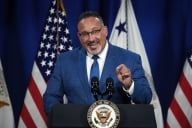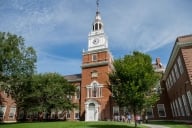You have /5 articles left.
Sign up for a free account or log in.
Graduate students in the College of Arts and Sciences at Washington University in St. Louis voted against forming a union affiliated with Service Employees International Union, according to a preliminary, inconclusive tally. Some 494 graduate assistants were eligible to vote; 216 voted down the union bid and 174 voted for it. About 174 ballots remain challenged; master’s degree students and students in the Institute of Materials Science and Engineering were allowed to vote in the election, but their eligibility to join a union has not yet been resolved.
SEIU did not immediately provide comment. Washington University said in statement that it’s pleased with the election turnout and that it will be some time before the final results are known. While the university challenged one ballot, it said, the union or the National Labor Relations Board challenged 173. Washington University said that SEIU, not it, waited until after the election to challenge those ballots, prolonging the process.
“The university continues to be committed to a transparent and fair election process,” it said. It also “continues to believe strongly that our graduate student experience is best supported when we work together -- not through a union. We also continue to disagree with the underlying determination that graduate students are employees.” Washington University said the NLRB has several cases pending that could reverse a 2016 decision saying that graduate student teaching and research assistants are in fact employees and therefore entitled to collective bargaining rights, “and we have argued that it is best to resolve this nationally, given the significance for all of higher ed.”
California, meanwhile, broadened its definition of graduate student employees. Earlier this month, Governor Jerry Brown signed into law an amendment to the Higher Education Employer-Employee Relations Act defining “employee” as all student employees in the University of California system. Previously, graduate research assistants -- unlike their teaching assistant counterparts -- were not considered employees entitled to collective bargaining. The change means that graduate research assistants may now organize to hold a union election. Teaching assistants across the university system already are represented by a union affiliated with the United Auto Workers. The change parallels the NLRB’s 2016 decision about graduate students on private campuses, which said that not only teaching assistants but also research assistants are entitled to collective bargaining.









